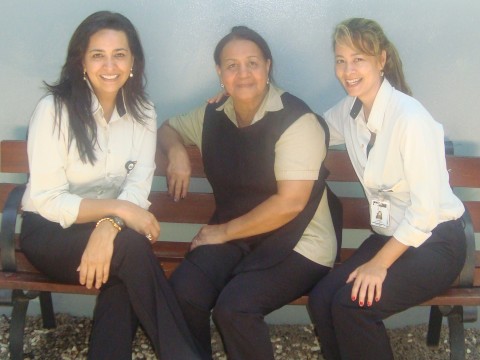Helisangela Mendonca (Manager, Continuous Improvement, Kupol), grew up in Paracatu, and studied Biology at the city’s local University. Her goal was to join the Environment team at our Paracatu operation – to be a part of the mining world that was such a fixture in her hometown.
Little did Helisangela know that her true calling would become something called “Continuous Improvement”, that she would earn a second degree in Mining & Metallurgy, and that her work at Kinross would take her from the heat of Brazil, to our global headquarters in Toronto, to the Arctic Circle of Russia.
Today Helisangela is the first expatriate female manager at Kinross to take on a Global Mobility assignment at Kupol. In February, Kinross World sat down with her to learn more about her Global Mobility experience.
Helisangela (left) at Paracatu, with Maria Aparecida Rodrigues and Claudia Pinto
Helisangela (left) at Paracatu, with Maria Aparecida Rodrigues and Claudia Pinto
I had become a CI Analyst at Paracatu and had been working at the operation for three and a half years when I saw the job posting for a CI role in Toronto. The job really interested me because it was a global opportunity, so I decided to apply…and as they say…the rest is history!
The job in Toronto involved 50% travel to the sites, and that meant I had the opportunity to visit so many places and meet so many Kinross people. One year later, a CI Manager position became available at Kupol, and I jumped at the chance to apply. Before I knew it, I was on my way to Russia!
The benefits of a global mobility assignment are infinite: accelerated career progression, deeper personal development, improved skills and expertise, greater cultural awareness, broader global networks, long-term friendships, increased confidence in overcoming challenges, enhanced creativity through exposure to new ideas…and that’s just to mention a few.
Helisangela at Fort Knox
Helisangela at Fort Knox
Helisangela and Isabel Espinoza conducting cycle time studies at Tasiast
Helisangela and Isabel Espinoza conducting cycle time studies at Tasiast
Kupol is amazing – not only for its geography (which is spectacular), but even more so for its people. It is a world class operation and I loved it from the first time I visited in 2012. They made me feel so welcome, and the camp facilities are very nice and comfortable. They have a full-size gym, an all-female gym, a sports hall, pool tables, ping pong tables, a music room, library, prayer room…the list goes on and on.
Helisangela at Kupol
Helisangela at Kupol
Well I have a husband and two sons – Henrique who is 21, and Bruno who is 18. Both of my boys are at university now – and my youngest is studying to become a Mining Engineer! I miss them and my husband a lot, but when I am away at Kupol we communicate using instant messenger and Skype.
Another big challenge is the difference in temperature between Kupol and Paracatu. Since I work on rotation schedule, when I leave Brazil to travel to Kupol, the temperature is at around +30 degrees Celsius, but in two days I am at Kupol, where it is -30 degrees Celsius.
The travel itself is a challenge. When I leave Kupol, there are different routes I can take to get to Brazil: I can fly from Magadan to Moscow…and then transfer at an airport in Europe to fly direct to São Paulo or Brasilia in Brazil. And even when I finally land in Brasilia… I still have a 2.5 hour drive from the airport to my home in Paracatu. All together it is 2.5 days of travelling.
Helisangela visits the local village of “Lamutskoye”, located near our Kupol operation

Helisangela visits the local village of “Lamutskoye”, located near our Kupol operation

Helisangela visits the local village of “Lamutskoye”, located near our Kupol operation

Helisangela visits the local village of “Lamutskoye”, located near our Kupol operation
Global mobility builds our skills. There is just no substitute for the global acumen you gain from an international assignment.
Helisangela (center) during risk assessment studies at Pevek with Sarah Ingram and Anastasia Mayakova
Helisangela (center) during risk assessment studies at Pevek with Sarah Ingram and Anastasia Mayakova



